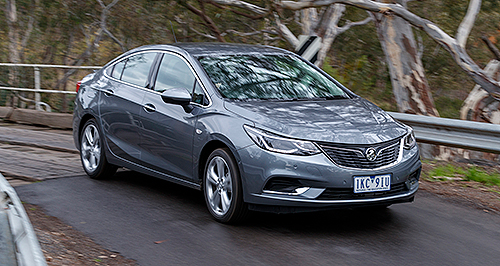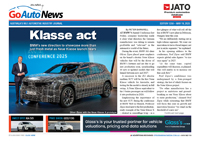News - Holden - AstraHolden axes Astra sedan, wagonFor whom the bell tolls: The current-generation Astra sedan (below) and wagon (right) have been discontinued in Australia after about two years on sale. Hatch to live on but sedan and wagon enter runout as Holden trims Astra line-up17 Jun 2019 GM HOLDEN has continued to cull models from its line-up, with the axe this time falling on the Astra small car’s sedan and wagon body styles.
Following in the tyre tracks of the Spark micro hatch and Barina light car that had their departures announced in April and September last year respectively, the sedan and wagon exit the Australian market in a time when the former was the best-selling of Astra’s three body styles.
A GM Holden spokesperson confirmed to GoAuto that the decision to discontinue the Astra sedan and wagon locally was prompted by supply issues and low volumes respectively, with the former accounting for 46.7 per cent of the model’s overall sales in the year to date.
Comparatively, the hatch – traditionally Astra’s best-selling body style – has taken a 42.0 per cent slice of the nameplate’s volume to the end of May this year, while the wagon has been responsible for only 11.2 per cent of sales.
The spokesperson added that the Astra sedan and wagon are currently in runout and will remain on the lion brand’s website until stock is cleared. Just seven sedans and 49 wagons were sold last month, compared to 323 hatches.
Unlike Astra’s Polish-sourced hatch, its sedan and wagon were imported from South Korea and the UK respectively.
On sale from June 2017, the current-generation Astra sedan was a rebadged version of the Chevrolet Cruze sedan produced at GM Korea’s Gunsan plant that was shuttered on May 31 this year. This facility was also responsible for manufacturing Barina before it was dropped.
GM Holden attempted to secure supply from GM’s plant in Lordstown, Ohio, but Cruze production also ended there on March 6 this year. The model is now only produced in China and Argentina.
Supply was also set to become an issue for the Astra wagon launched in September 2017 that came from Vauxhall’s Ellesmere Port factory, which is now owned by Groupe PSA after GM officially exited Europe on November 1, 2017.
The load-lugging version of Astra played in a small portion of the sub-$40,000 small-car segment, with rivals including wagon derivates of the Volkswagen Golf, Ford Focus, Peugeot 308 and Renault Megane.
Conversely, the Astra had a larger pool of rivals in the same class, including three-box variants of the Mazda3, Toyota Corolla, Kia Cerato, Honda Civic, Subaru Impreza, Hyundai Elantra and Renault Megane.
Overall sales of Astra have taken a significant hit this year, with 2876 examples sold to the end of May – a 21.1 per cent decrease over the 3647 deliveries made during the same period in 2018.
As reported, the Astra sedan was available in four grades (LS, LS+, LT and LTZ), while its wagon counterpart was only offered in two flavours (LS+ and LT).
The manual LS sedan was the price-leading Astra variant, costing $20,490 before on-road costs – $1000 less than the manual R hatch.
The wagon pair commanded a $3000 to $4150 premium over their sedan counterparts but justified the extra outlay with the standard fitment of autonomous emergency braking and DAB+ digital radio plus up to 1630L of cargo capacity.
Both body styles were exclusively front-wheel drive and motivated by a 1.4-litre turbo-petrol four-cylinder engine that produced 110kW of power and 240Nm of torque.  Read more18th of September 2018  Holden drops BarinaAfter 33 years on the market, Holden kills off Barina nameplate23rd of April 2018  Holden extinguishes SparkSpark micro car dropped from Holden’s line-up due to slowing sales26th of September 2017  Holden Astra Sportwagon checks inVW Golf-rivalling Holden Astra Sportwagon hits showrooms next month15th of June 2017  Driven: Holden Astra sedan to sell less than hatchSouth Korean-made Holden Astra sedan will add to, not oust hatch sales |
Click to shareHolden articlesResearch Holden Astra pricing
Motor industry news |
















Facebook Twitter Instagram